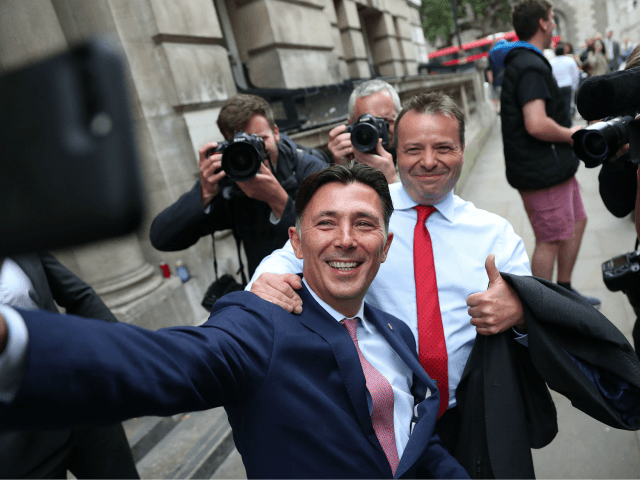Brexit-backing business tycoon Arron Banks and Leave.EU CEO Liz Bilney have won a settlement against the Electoral Commission after it was admitted that there is “no evidence” they committed criminal offences.
The settlement concerned the Electoral Commission’s 2018 referral of Mr Banks and Ms Bilney to the National Crime Agency (NCA) over allegations from Remainers that Banks had channelled Russian “dark money” into the Brexit campaign.
The Electoral Commission claimed that it was “right” to make the criminal referral, yet admitted that there was no evidence for the claims against Mr Banks, writing in a statement:
The National Crime Agency, after its own investigation, has (i) concluded that there is no evidence that any criminal offences have been committed under PPERA or company law by any of the individuals or organisations referred to it by the Electoral Commission; and (ii) has stated that it has not received any evidence to suggest that Mr Banks and his companies received funding from any third party to fund the loans subject to the investigation, or that Mr Banks acted as an agent on behalf of a third party. The Electoral Commission accepts these conclusions.
In response to the settlement, Mr Banks said that the Electoral Commission should “face a Parliamentary select committee over the way they colluded with Remain MPs to create false Russia hoax.”
Brexit Party Leader Nigel Farage said: “After years of false and damaging allegations, Arron Banks wins against the biased Electoral Commission. The Remain establishment have behaved appallingly since they lost in the referendum. The [Electoral Commission] is not fit for purpose.”
The Electoral Commission has long faced accusations that it has an institutional anti-Brexit bias despite its claims of impartiality
In June of last year, a court overturned the maximum individual fine of £20,000 that the Commission had wrongly imposed on youth campaigner Darren Grimes over referendum spending returns — forcing the Electoral Commission to write off its taxpayer-funded legal expenses and cover Mr Grimes’s costs as well.
Accusations of unlawful collusion by Remain campaigners, on the other hand, were not investigated, despite the Commission being presented with a comprehensive dossier of evidence by Priti Patel MP, now the Home Secretary.
More recently, the Commission launched a highly-public last-second investigation into Brexit Party donations on the eve of the 2019 EU elections, despite having no hard evidence of wrongdoing and despite the fact other parties received donations in the same way.
Critics of the quango believed the stunt was intended to give an impression of foul play regardless of whether or not any existed — in the end no issues with the donations were found — with party leader Nigel Farage slamming it as “full of Remainers” and “rotten to the core”.
Despite this latest victory he legal battle for Mr Banks over the 2016 Brexit vote will continue, however, as he currently suing Guardian investigative reporter Carole Cadwalladr for libel.
The suit focuses on a comments Ms Cadwallar made in a 2019 TED talk, in which she accused the business tycoon of clandestinely working with the Russian government.
“And I’m not even going to go into the lies that Arron Banks has told about his covert relationship with the Russian government,” Cadwalladr said.
Despite the findings of the National Crime Agency and the Electoral Commission, Cadwalladr has yet to retract her conspiratorial claims.
Follow Kurt on Twitter at @KurtZindulka

COMMENTS
Please let us know if you're having issues with commenting.